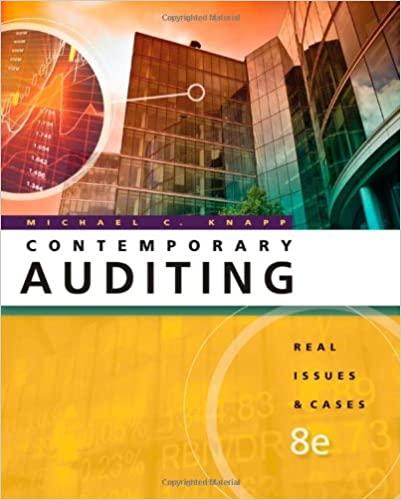Awaiting his court appearance to be charged with securities fraud, David Myers sat in a jail cell
Question:
Awaiting his court appearance to be charged with securities fraud, David Myers sat in a jail cell in 2002 and counted the cinder blocks again and again to distract himself.1 In his pocket was a plastic red dog named Clifford, given to him by his young son. “He’ll take care of you,” the boy had said, according to his mother.
For Mr. Myers, the former controller of WorldCom Inc., the past four years have been a life-altering journey. It began when the prosperous businessman and father of three put aside his misgivings and agreed to go along with false accounting entries that eventually became part of an \($11\) billion fraud.
The scheme Mr. Myers participated in set off a chain of events that had a devastating impact on his company, his colleagues, and his family. The collapse of the telecommunications giant resulted in the loss of more than 17,000 jobs and billions of dollars in pensions and investments.
Hoping to win a lighter sentence, Mr. Myers, 47 years old, pleaded guilty and immersed himself in the government’s investigation. He helped prosecutors identify false numbers in WorldCom’s fi nancial fi lings from 2000 to 2002. That evidence, and his court testimony, helped convict WorldCom Chief Executive Officer Bernard Ebbers last week for his role in one of the largest financial frauds in corporate history. As the U.S. government rolls through a historic wave of prosecutions of business fraud, Mr. Myers is one of the executives watching a successful life come unglued. He and his family are now preparing for his sentencing set for June. Federal guidelines suggest he could serve more than 10 years in prison, though he is expected to receive a shorter sentence because of his cooperation.
“We don’t know what is going to happen,” says his wife, Lynn, 39. “I don’t know if he’s going to prison or for how long. I just want him home.”
Raised in Jackson, Mississippi, Mr. Myers played basketball and was an honor student in high school. The son of civil servants, he earned degrees in marketing and accounting from the University of Mississippi. He married, had two children, and divorced in 1990. In 1993, Mr. Myers married his second wife, Lynn, an interior designer and onetime cheerleader, who is also a Jackson native. The couple settled into a suburban life working in the yard and having dinners with friends. They had a son, Jack, now five.
Mr. Myers joined WorldCom in 1995 as treasurer—just as the telecom upstart was about to hit a huge growth spurt.
As WorldCom’s stock price rose through the late 1990s, the lifestyle [of the Myers family] grew richer. They moved to a house on the edge of a large, bass-filled lake.
The couple began traveling to London, Paris, and Bermuda on WorldCom business trips. When WorldCom’s share price peaked in 1999, the options held by the Myerses were valued at more than \($15\) million, though they cashed in only about \($300,000\) worth. “We had a good life and knowing the options were there was nice,” says Mrs. Myers. The party ended in 2000 amid the bursting of the Internet bubble and a stiff price war among telecom companies. WorldCom’s business began a sharp decline.
In January 2001, Mr. Myers and Buford Yates, an accountant who worked for him, met in the office of WorldCom’s chief financial officer, Scott Sullivan, according to testimony from Mr. Myers. Knowing WorldCom wouldn’t meet analyst expectations for the coming quarter, the three agreed, at Mr. Sullivan’s behest, to reclassify some of the company’s biggest expenses, according to Mr. Myers’ testimony. This essentially moved expenses off WorldCom’s income statement, erasing their effect on the bottom line. “I didn’t think that was the right thing to do, but I had been asked by Scott to do it and I was asking him [Mr. Yates] to do it,” Mr. Myers testified.
In an illustration of how huge ethical lapses often begin with small steps, he justified his actions to himself, thinking WorldCom’s business would soon improve, people close to the case say. But rather than being a stopgap measure, the improper accounting continued. Mr. Myers helped direct false entries again and again. People close to Mr. Myers say he believed Mr. Sullivan’s explanations that eventually the company’s problems would be straightened out......
Questions
1. Does the fact that David Myers’ superior, Scott Sullivan, asked him to make the false accounting entries in WorldCom’s accounting records diminish Myers’ responsibility for his improper conduct? Defend your answer.
2. What punishment, if any, do you believe David Myers should have been given for his role in the WorldCom fraud?
3. Is it appropriate for federal law enforcement authorities “to make an example” of individuals involved in high-profi le fi nancial frauds, such as WorldCom and Enron? Explain.
Step by Step Answer:

Contemporary Auditing Real Issues And Cases
ISBN: 9780538466790
8th Edition
Authors: Michael C. Knapp





